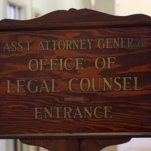Located within the Department of Justice, the Office of Legal Counsel functions as one of the most powerful legal bodies in the federal government. Although few have heard of it, the office is responsible for putting forth legal opinions that shape the public policies of the executive branch. Its most important duty is helping to define the legality of decisions made by the White House. While the Constitution gives the US Attorney General responsibility for providing legal advice to the President, the Office of Legal Counsel has become the de facto legal advisor to the Oval Office. During the administration of George W. Bush, the office has become the center of numerous controversies surrounding the President’s bold—and probably illegal—efforts to extract information from suspected terrorists. One of the most heated criticisms of the Bush administration has been its decision to allow military and intelligence officers to use torture while interrogating detainees—a decision based on the legal rationale provided by the Office of Legal Counsel. The low-profile office also has ruled that the federal government can legally fund organizations that discriminate in their hiring based on religious preferences.
The Office of Legal Counsel was created in 1934 by Congress as part of an executive branch reorganization that involved the Department of Justice. The office was headed by an assistant solicitor general until 1951 when Attorney General J. Howard McGrath elevated the office’s top post to assistant attorney general in charge. The office was also renamed the Executive Adjudications Division. This lasted for two years until the name was changed to Office of Legal Counsel by Attorney General Herbert Brownell.
- Table of Contents
- Overview
- History
- What it Does
- Where Does the Money Go
- Controversies
- Suggested Reforms
- Comments
- Leave a comment

On March 24, 2014, President Barack Obama appointed Karl Remón Thompson as principal deputy assistant attorney general in the Office of Legal Counsel in the Justice Department. That office issues opinions on whether actions taken by the president and other members of the Executive Branch are legal. This gives those who carry out the actions legal cover. During the George W. Bush administration, that office issued memos declaring that methods interrogation methods commonly considered torture, including waterboarding, were legal.
Thompson attended Harvard University, graduating in 1991. He went on to earn a Ph.D. in political theory from Cambridge in 1998, writing his thesis on “The Logic of Political Prudence.” Thompson then went to law school at the University of Chicago, graduating in 2000. While there, he was articles editor of the university’s law review.
After graduation, Thompson became a law clerk, first for David S. Tatel, a judge on the District of Columbia Court of Appeals. He then moved to the Supreme Court, clerking for Justice Ruth Bader Ginsburg during the 2002-2003 term.
Thompson then accepted a position at the law firm of O’Melveny & Myers. One of his more significant cases was the successful representation of the drug maker Merck & Co. in a lawsuit dealing with its painkiller drug Vioxx, which was later pulled from the market after evidence showed that it increased the risk of heart problems for patients.. Another case Thompson handled was destined to spur criticism of him as he entered government service. He assisted a Navy lawyer in the defense of Omar Khadr, a terror suspect held at Guantánamo. Right-wing publications criticized Thompson and other attorneys who’d helped in the defense of Guantánamo prisoners. However, others from all parts of the political spectrum defended Thompson and his colleagues.
In 2009, Thompson left private practice to join the Office of Legal Counsel. His first post was as counsel to the assistant attorney general. Later, he was named a deputy assistant attorney general. Beginning in February 2013, Thompson became a counselor in the office of Attorney General Eric Holder, where he handled issues related to the Civil Division, the Office of the Solicitor General, and the Office of Legal Counsel.
In the absence of an Assistant Attorney General, Thompson will lead the Office of Legal Counsel. Obama has not nominated anyone to fill that post on a permanent basis, as it’s thought that it would be difficult for anyone to be confirmed by the Senate for that post.
Thompson is the co-editor of the 2009 book It Is a Constitution We Are Expounding, writings on interpreting the U.S. Constitution.
-Steve Straehley
To Learn More:

- Latest News
- D.C. Public Schools will Teach all Second-Graders to Ride a Bike
- New Rule in Germany Limits Sales of Sex-Themed E-Books to 10pm to 6am
- What Happened to the 6-Year-Old Tibetan Boy the Chinese Government Kidnapped 20 Years Ago?
- U.S. Ambassador to Turkey Photoshops his Hair Color to Mock Turkish Mayor
- Mystery Artist Calls Attention to Unfixed Potholes by Drawing Penises around Them
Located within the Department of Justice, the Office of Legal Counsel functions as one of the most powerful legal bodies in the federal government. Although few have heard of it, the office is responsible for putting forth legal opinions that shape the public policies of the executive branch. Its most important duty is helping to define the legality of decisions made by the White House. While the Constitution gives the US Attorney General responsibility for providing legal advice to the President, the Office of Legal Counsel has become the de facto legal advisor to the Oval Office. During the administration of George W. Bush, the office has become the center of numerous controversies surrounding the President’s bold—and probably illegal—efforts to extract information from suspected terrorists. One of the most heated criticisms of the Bush administration has been its decision to allow military and intelligence officers to use torture while interrogating detainees—a decision based on the legal rationale provided by the Office of Legal Counsel. The low-profile office also has ruled that the federal government can legally fund organizations that discriminate in their hiring based on religious preferences.
The Office of Legal Counsel was created in 1934 by Congress as part of an executive branch reorganization that involved the Department of Justice. The office was headed by an assistant solicitor general until 1951 when Attorney General J. Howard McGrath elevated the office’s top post to assistant attorney general in charge. The office was also renamed the Executive Adjudications Division. This lasted for two years until the name was changed to Office of Legal Counsel by Attorney General Herbert Brownell.
Comments

On March 24, 2014, President Barack Obama appointed Karl Remón Thompson as principal deputy assistant attorney general in the Office of Legal Counsel in the Justice Department. That office issues opinions on whether actions taken by the president and other members of the Executive Branch are legal. This gives those who carry out the actions legal cover. During the George W. Bush administration, that office issued memos declaring that methods interrogation methods commonly considered torture, including waterboarding, were legal.
Thompson attended Harvard University, graduating in 1991. He went on to earn a Ph.D. in political theory from Cambridge in 1998, writing his thesis on “The Logic of Political Prudence.” Thompson then went to law school at the University of Chicago, graduating in 2000. While there, he was articles editor of the university’s law review.
After graduation, Thompson became a law clerk, first for David S. Tatel, a judge on the District of Columbia Court of Appeals. He then moved to the Supreme Court, clerking for Justice Ruth Bader Ginsburg during the 2002-2003 term.
Thompson then accepted a position at the law firm of O’Melveny & Myers. One of his more significant cases was the successful representation of the drug maker Merck & Co. in a lawsuit dealing with its painkiller drug Vioxx, which was later pulled from the market after evidence showed that it increased the risk of heart problems for patients.. Another case Thompson handled was destined to spur criticism of him as he entered government service. He assisted a Navy lawyer in the defense of Omar Khadr, a terror suspect held at Guantánamo. Right-wing publications criticized Thompson and other attorneys who’d helped in the defense of Guantánamo prisoners. However, others from all parts of the political spectrum defended Thompson and his colleagues.
In 2009, Thompson left private practice to join the Office of Legal Counsel. His first post was as counsel to the assistant attorney general. Later, he was named a deputy assistant attorney general. Beginning in February 2013, Thompson became a counselor in the office of Attorney General Eric Holder, where he handled issues related to the Civil Division, the Office of the Solicitor General, and the Office of Legal Counsel.
In the absence of an Assistant Attorney General, Thompson will lead the Office of Legal Counsel. Obama has not nominated anyone to fill that post on a permanent basis, as it’s thought that it would be difficult for anyone to be confirmed by the Senate for that post.
Thompson is the co-editor of the 2009 book It Is a Constitution We Are Expounding, writings on interpreting the U.S. Constitution.
-Steve Straehley
To Learn More:

- Latest News
- D.C. Public Schools will Teach all Second-Graders to Ride a Bike
- New Rule in Germany Limits Sales of Sex-Themed E-Books to 10pm to 6am
- What Happened to the 6-Year-Old Tibetan Boy the Chinese Government Kidnapped 20 Years Ago?
- U.S. Ambassador to Turkey Photoshops his Hair Color to Mock Turkish Mayor
- Mystery Artist Calls Attention to Unfixed Potholes by Drawing Penises around Them






Comments